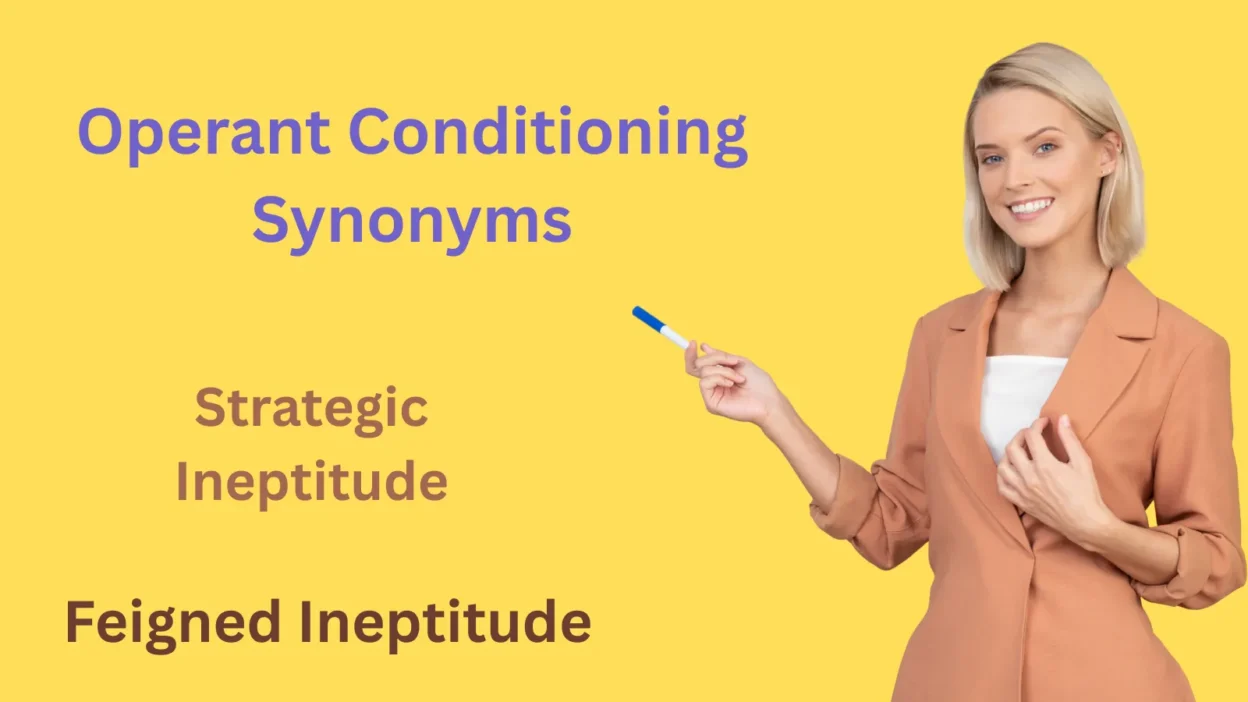Operant conditioning synonyms, such as behavior modification, reinforcement learning, and instrumental conditioning, describe the process of shaping behavior through rewards and consequences. For example, “behavior modification” focuses on changing actions through reinforcement, while “instrumental conditioning” highlights learning through outcomes. These terms capture the scientific and psychological sides of how behavior is influenced, practiced, and maintained.
If you’re writing about psychology, education, or behavioral science, using the right synonym for operant conditioning helps you explain complex ideas in clear and relatable terms.
These synonyms of operant conditioning not only enhance your writing but also deepen your understanding of how behavior changes through feedback and motivation. From classroom learning to habit formation, the language of operant conditioning shows how actions and results are closely linked.
What Does Operant Conditioning Mean?
Operant conditioning is a learning process where behavior is shaped by rewards or punishments. It often involves:
- Reinforcement (positive or negative)
- Consequences that guide future behavior
- Reward-based habit formation
- Behavioral patterns shaped over time
It’s not just about reaction—it’s about learning through experience. Think of operant conditioning as the science of how actions bring results, and how those results teach us what to do next.
Synonyms for Operant Conditioning (with Meanings, Examples, and Usage Tips)
1. Behavioral Training
Meaning: Teaching specific actions through repetition, rewards, or corrections.
Example: “The dog learned to sit through consistent behavioral training.”
When to Use: Use this in animal training or child education contexts.
2. Reinforcement Learning
Meaning: Learning by receiving feedback — positive or negative — from outcomes.
Example: “Reinforcement learning helps AI systems improve their decision-making.”
When to Use: Ideal for psychology, AI, or neuroscience discussions.
3. Behavior Modification
Meaning: Systematic approach to changing behavior using rewards and punishments.
Example: “The therapist used behavior modification to help reduce the patient’s anxiety habits.”
When to Use: Common in clinical and therapeutic contexts.
4. Conditioning
Meaning: A broad term for learning associations between stimuli and responses.
Example: “Conditioning can shape habits from a young age.”
When to Use: Suitable for general discussions of learned behavior.
5. Habit Formation
Meaning: Developing automatic behaviors through repetition and reinforcement.
Example: “Morning workouts became a habit formation success for her.”
When to Use: Use in self-improvement or lifestyle writing.
6. Reward-Based Learning
Meaning: Learning driven by incentives or positive outcomes.
Example: “Reward-based learning motivates students to achieve more.”
When to Use: When emphasizing motivation or education.
7. Punishment-Based Learning
Meaning: Behavior shaped by avoidance of negative consequences.
Example: “Punishment-based learning can suppress unwanted habits.”
When to Use: Use when discussing discipline or deterrence.
8. Stimulus-Response Learning
Meaning: Associating specific behaviors with specific triggers or cues.
Example: “Stimulus-response learning explains why we flinch at sudden loud noises.”
When to Use: Technical or academic psychology contexts.
9. Operant Behavior
Meaning: Actions controlled by their consequences.
Example: “Operant behavior is the foundation of adaptive learning.”
When to Use: Appropriate for behavioral science discussions.
10. Instrumental Conditioning
Meaning: A close synonym emphasizing that actions are “instruments” for rewards.
Example: “Instrumental conditioning links effort to achievement.”
When to Use: In academic or theoretical explanations.
11. Contingency Management
Meaning: Behavior change through planned rewards and consequences.
Example: “Contingency management helped reduce substance abuse in patients.”
When to Use: Common in clinical psychology and addiction treatment.
12. Positive Reinforcement
Meaning: Strengthening behavior by adding a pleasant outcome.
Example: “Giving praise is a form of positive reinforcement.”
When to Use: Best in educational or motivational settings.
13. Negative Reinforcement
Meaning: Strengthening behavior by removing an unpleasant condition.
Example: “Turning off the alarm after waking up is negative reinforcement.”
When to Use: Use in academic or behavioral analysis.
14. Behavior Therapy
Meaning: A therapeutic approach that modifies problematic actions.
Example: “Behavior therapy is effective for managing phobias.”
When to Use: Use in mental health or counseling discussions.
15. Learning by Consequences
Meaning: Understanding actions through the outcomes they produce.
Example: “Children learn by consequences when rewarded for good deeds.”
When to Use: For simpler or layman explanations of the concept.
16. Adaptive Learning
Meaning: Adjusting behavior based on experience or feedback.
Example: “Humans excel at adaptive learning in complex environments.”
When to Use: Great for AI, psychology, or workplace performance topics.
17. Motivational Conditioning
Meaning: Shaping behavior through internal or external motivation.
Example: “Motivational conditioning keeps athletes consistent.”
When to Use: Use in sports, fitness, or self-help contexts.
18. Behavioral Engineering
Meaning: Designing environments that encourage desired behavior.
Example: “Behavioral engineering can promote healthy habits in communities.”
When to Use: Best in organizational or social psychology discussions.
19. Reward System Training
Meaning: Structuring tasks to provide consistent rewards for effort.
Example: “Teachers use reward system training to improve student focus.”
When to Use: Education or management-related writing.
20. Behavioral Shaping
Meaning: Gradually molding actions toward a desired outcome through reinforcement.
Example: “The dolphin’s performance was a result of behavioral shaping.”
When to Use: Ideal in training or experimental psychology.
21. Learned Behavior
Meaning: Behavior acquired from experience rather than instinct.
Example: “Politeness is a learned behavior reinforced by social approval.”
When to Use: General or sociocultural discussions.
22. Cognitive Conditioning
Meaning: Linking mental expectations with external reinforcement.
Example: “Cognitive conditioning influences how people anticipate rewards.”
When to Use: In psychology or cognitive science writing.
23. Behavioral Adaptation
Meaning: Adjusting actions to fit new circumstances or feedback.
Example: “Workplace behavioral adaptation improves team efficiency.”
When to Use: Corporate, environmental, or psychological contexts.
24. Behavioral Psychology
Meaning: The field studying how rewards and punishments shape behavior.
Example: “Behavioral psychology explores why we repeat certain habits.”
When to Use: Use when referring to the academic discipline.
25. Habit Conditioning
Meaning: The process of creating routines through reinforcement.
Example: “Habit conditioning helped him wake up early every day.”
When to Use: Self-discipline or productivity contexts.
26. Operant Learning
Meaning: Another term for learning through behavior-consequence patterns.
Example: “Operant learning helps animals respond effectively to their environments.”
When to Use: In scientific or educational explanations.
27. Response Conditioning
Meaning: Teaching consistent reactions to certain stimuli.
Example: “Response conditioning is essential in behavioral therapy.”
When to Use: When describing controlled experiments.
28. Performance Reinforcement
Meaning: Encouraging improved behavior through structured rewards.
Example: “Managers use performance reinforcement to increase productivity.”
When to Use: Workplace or leadership contexts.
29. Consequence-Based Learning
Meaning: Understanding behavior through cause-and-effect patterns.
Example: “Consequence-based learning shapes how children behave in classrooms.”
When to Use: Education or parental training discussions.
30. Reward-Contingent Learning
Meaning: Learning that depends on receiving a reward for correct actions.
Example: “Reward-contingent learning keeps employees engaged.”
When to Use: Motivational or behavioral performance settings.
How to Choose the Right Synonym for Operant Conditioning
Choosing the right synonym for operant conditioning depends on what part of the learning process you want to emphasize. Here’s how to decide:
- Behavioral learning – Use when focusing on how behavior changes through experience or practice.
- Reinforcement learning – Best for describing reward and punishment systems that shape actions.
- Instrumental conditioning – Ideal for scientific or academic writing that stresses cause-and-effect between action and consequence.
- Response conditioning – Works well when explaining how specific reactions are trained through feedback.
- Contingency learning – Use when discussing how outcomes depend on actions, like “If I do this, then that happens.”
✅ Tip: Match your synonym to your audience and purpose. For example, say “Reinforcement learning explains how habits form” in psychology, or “Behavioral learning helps teachers understand student motivation” in education.
Cultural and Emotional Context
- In Western cultures, operant conditioning is often discussed in self-improvement and parenting, with an emphasis on positive reinforcement.
- In clinical settings, neutral or technical terms like contingency management or behavior modification are preferred to avoid emotional connotations.
- In workplace motivation, softer terms like performance reinforcement feel more encouraging and less punitive.
Conclusion:
Operant conditioning and its synonyms—like behavioral learning, reinforcement learning, and instrumental conditioning—all describe how actions are shaped by rewards and consequences. Each term highlights a slightly different side of the same idea: we learn by what happens after we act.
Whether you’re writing about psychology, teaching, or behavior change, using the right synonym helps make your message clear and precise.
In simple terms, these words remind us that behavior is not random—it’s learned, repeated, and refined through experience.





